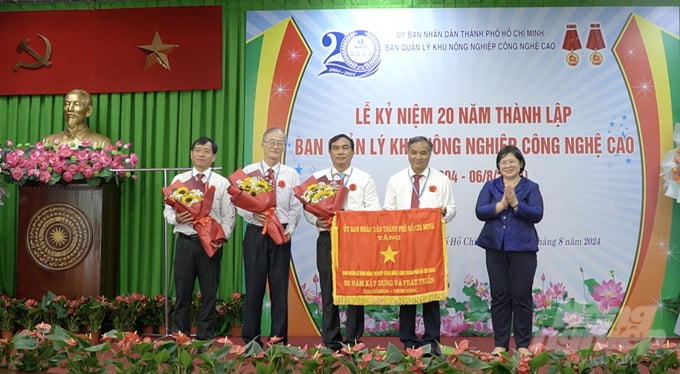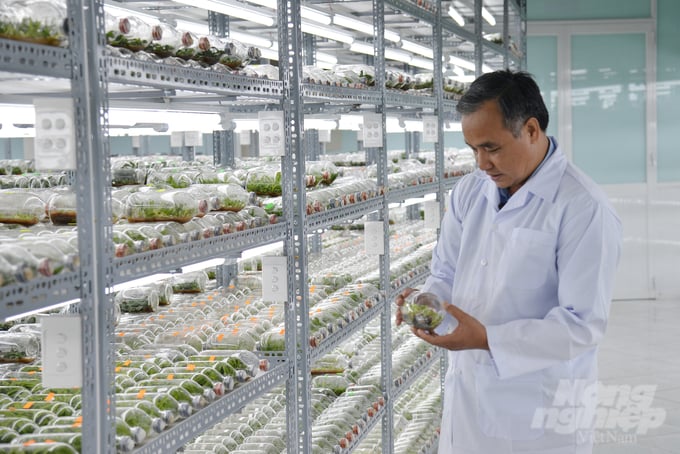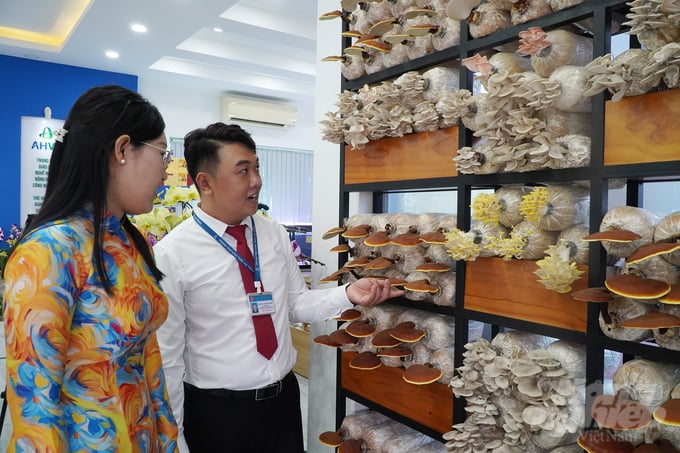June 1, 2025 | 19:28 GMT +7
June 1, 2025 | 19:28 GMT +7
Hotline: 0913.378.918
June 1, 2025 | 19:28 GMT +7
Hotline: 0913.378.918

Van Thi Bach Tuyet, Member of the City Party Committee and head of the Organizing Committee of the Ho Chi Minh City Party Committee presents the traditional flag of the Ho Chi Minh City People's Committee to the Management Board of the Ho Chi Minh City High-Tech Agricultural Park. Photo: Nguyen Thuy.
On August 6, the Management Board of the Ho Chi Minh City High-Tech Agricultural Park holds a ceremony to celebrate its 20th anniversary (August 6, 2004 - August 6, 2024). “The unit was established on an area of over 88 ha in Cu Chi district. From 10 initial staff, after 20 years, it now has more than 300 members,” said Pham Dinh Dung, Head of the Management Board of the Ho Chi Minh City High-Tech Agricultural Park.
With the assigned role and tasks, along with the efforts of civil servants, employees, and staff, the High-Tech Agricultural Park has contributed to the overall development of the agricultural sector of Ho Chi Minh City in particular and the whole country in general through various activities, including scientific research, collection, conservation, testing, crossbreeding, building models of high-tech agricultural transfer, producing seedlings and livestock and supplying them to the city and the whole country. The primary goal is always towards innovation, digital transformation in agriculture and business incubation.
After 20 years of formation and development, up to now, the Management Board of the High-Tech Agricultural Park has made great contributions in researching and applying new advanced technologies to create breakthroughs in the quality and productivity of agro-products, meeting the increasing demands of society while developing sustainable agriculture.
“Ho Chi Minh City is oriented towards shifting the structure of crops and livestock, developing modern and sustainable urban agriculture, developing ecological agriculture, high-tech agriculture, enhancing the application of science and technology specifically new and advanced technologies, biotechnology in selecting and creating high-quality varieties of crops, livestock and aquatic products,” said Van Thi Bach Tuyet, Member of the City Party Committee, Head of the Organizing Committee of the Ho Chi Minh City Party Committee.

Ho Chi Minh City High-Tech Agricultural Park has transferred many models of applying science and technology, many varieties of plants and animals to many cooperatives, farmers, and enterprises in Ho Chi Minh City and the whole country in recent times. Photo: Nguyen Thuy.
The agricultural sector will face both opportunities and challenges in the future, requiring continued changes in production methods in the direction of mastering and applying science and technology to develop modern, high-productivity agriculture, thereby contributing to transforming the growth model of the city's agricultural sector towards sustainable development, increasing the added value of agro-products in the city and expanding investment to other localities. The ultimate objective is to increase revenue for the city.
Van Thi Bach Tuyet expresses high expectations towards Ho Chi Minh City High-Tech Agricultural Park. The Management Board of Ho Chi Minh City High-Tech Agricultural Park will continue to unite, pay attention to training, and attract high-quality human resources; promote research, application of scientific and technological advances, innovation in production; speed up digital transformation in the agricultural sector, and adapt to climate change;
Support the formation and effective operation of enterprises in the application of high-tech agriculture in the fields of crop production, husbandry and aquaculture; expand international cooperation, transfer new and advanced technologies;
Create a scientific working environment, respect academic freedom; propose innovative financial mechanisms; evaluate objectively and fairly to recognize, honor, and create development opportunities for capable and contributing staff;
Develop new scientific ideas; come up with cooperation activities in scientific research with foreign research and training organizations, strengthen cooperation in scientific research with ministries and branches at central and local levels.

Mushroom growing model at Ho Chi Minh City High-Tech Agricultural Park. Photo: Nguyen Thuy.
The Management Board will aim to realize the goal by 2030, building and developing the Ho Chi Minh City High-Tech Agricultural Park into a center for investment and development of science and technology, gradually becoming the nucleus of the process of agricultural economy restructuring, contributing to transforming the growth model of the city's agricultural sector towards sustainable development.
It will become a place to attract investment in the fields of research, development and application of high technology in agroproduction, improve research capacity, transfer, application and creation of high-tech products to serve the development of the fields of crop production, husbandry, aquaculture and associated with the value chain of safe products. Its utmost priority is to make an important contribution in applying the results of scientific and technological research and development into production to enhance product value and increase income for people.
Translated by Samuel Pham

(VAN) Several scientists and farmers are experimenting with soil treatment in some key durian-growing regions such as Cai Lay (Tien Giang), Dak Song, Gia Nghia, and Dak R’lap (Dak Nong).
/2025/05/25/4127-3-073637_820.jpg)
(VAN) Thanks to the promotion from an FAO-implemented project, vegetable production in greenhouses in Moc Chau has seen strong development, from 1.5 hectares in 2021 to nearly 50 hectares in 2024.

(VAN) FAO has recently supported USD 140,000 to implement the project 'Risk mitigation human-animal interface risks through disease control initiatives in pig farming.'

(VAN) The People's Committee of Tra Vinh province has approved an adjustment to the investment policy for the Green Hydrogen Plant project, increasing its area to approximately 52.76 hectares.
![Reducing emissions from rice fields: [2] Farmers’ commitment to the soil](https://t.ex-cdn.com/nongnghiepmoitruong.vn/608w/files/news/2025/05/05/dsc08881jpg-nongnghiep-140632.jpg)
(VAN) Clean rice cultivation model in Thuong Tan commune, Bac Tan Uyen district, is assisting local residents in achieving sustainable agriculture by substantially reducing costs, increasing productivity, and protecting the environment.

(VAN) At the conference to disseminate Resolution No. 68, AgriS introduced its digital agricultural ecosystem and reaffirmed its commitment to accompanying the Government in promoting private sector development and sustainable agriculture.

(VAN) 'Blue Ocean - Blue Foods' initiative is designed to restore marine ecosystems and establish sustainable livelihoods for local communities by cultivating a minimum of 1,000 hectares of cottonii seaweed in the first three years.